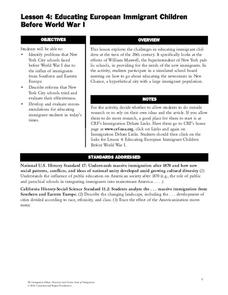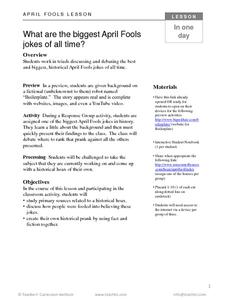Curated OER
Epic Improvisation
Really? Rapping The Odyssey? Really. A discussion of the oral tradition of story telling and its links to Epic poetry sets the stage for a series of activities that encourage improvisation to integrate music into other classrooms....
Institute of Electrical and Electronics Engineers
Shake it up with Seismographs!
Shake things up in your STEM or earth science classroom when you have small groups construct their own seismographs. A reading assignment on the history of seismographs, the Richter scale, and current technology sets the stage for the...
Curated OER
War Making: Executive and Legislative Powers
Students examine executive and legislative powers. In this federal powers lesson, students determine who has the power to wage war in the U.S. government. Students analyze the Constitution and research historical precedents regarding...
The New York Times
Investigating the Heroin and Prescription Opioid Epidemic
How bad is the opioid crisis in America? Has it gotten worse in the last few decades? Why? High schoolers delve into these questions with a thorough and thoughtful lesson from The New York Times on heroin prescription opioids. Starting...
Institute of Electrical and Electronics Engineers
Stop and Go
It's "Green light, go!" with this lesson! STEM classes are illuminated with the history of traffic signals and how the engineering design has improved over time. They also learn about patents for new inventions. Finally, they research in...
Curated OER
What Can We Learn about India from a Ten Rupee Bank Note?
The class finds and cites evidence showing India's unity in diversity and work to recognize some of the complex interactions of a civilized community. They read to understand how geography, history, politics, economics, beliefs, and...
Curated OER
Cartoon and Political Poster Analysis
Students explore the late 1800s as a time of demographic change in the US. They view the role of media during this time in the form of posters and political cartoons. They create a political poster/cartoon that deals with current...
Institute of Electrical and Electronics Engineers
History of Computing – EEEEK- A Mouse!
Students examine the concepts of computer and mechanical engineering. They dissemble a computer mouse and create a new design for the mouse. They also design new enhancements for the mouse over time.
Curated OER
Human Rights in the Philippines
Students examine the meaning of human rights under the United Nations system, in the U.S., and the Philippines. They conduct research, discuss the concepts in groups, and conduct a debate on the human rights situation post Marcos...
Curated OER
Breaking News: International Coalition Attacks Libya (March 20th, 2011)
Students explore current events by completing a list of worksheet activities. In this Libyan history lesson, students read a news article discussing the problems with Gaddafi in Libya and the effect it is having in the Middle East....
Curated OER
US Foreign Policy at the Turn of the Millennium
Learners explore U.S. foreign policy. In this diplomacy lesson, students discuss and analyze the evolution of U.S. foreign policy between 1970 and 2000. Learners research their textbooks, the Internet, videos, and filmstrips.
Curated OER
US Government: Foreign Policy (Part 1)
Students explore foreign policy. In this foreign policy lesson plan, students define terms regarding foreign policy. Students respond to questions regarding textbook readings and a lecture regarding U.S. foreign policy.
Curated OER
Tracing Migration Patterns
Seventh graders analyze migration patterns. In this migration instructional activity, 7th graders use U.S. Census records to trace the migration patterns of 2 German families in Kansas.
Constitutional Rights Foundation
Refugees from the Caribbean: Cuban and Haitian “Boat People”
Should refugees fleeing poverty be allowed the same entrance into the United States as those fleeing persecution? High schoolers read about US foreign policy in the late 20th century regarding refugees from Cuba and Haiti, and engage in...
Smithsonian Institution
Changing Gender Roles on the Home Front
Many historians discuss how gender roles changed because of World War II, but how did this come to be? An informative resource challenges scholars to do some digging and research the information for themselves. They research how...
Roy Rosenzweig Center for History and New Media
Yankee Doodle: How Has It Changed over Time?
Grab your feathers and your hat! And perhaps some macaroni! It's time to investigate the evolution of "Yankee Doodle Dandy." Groups do a close reading of sheet music covers, lyrics, and even YouTube videos to see how this political song...
Constitutional Rights Foundation
Educating European Immigrant Children Before World War I
As if surviving a journey to America wasn't enough of a feat for early 20th century immigrants, they then needed to settle into American life. Learn about the ways New York public education attempted to meet the needs of its students,...
Stanford University
Observing Human Rights Day
How much intervention is appropriate for America to take in cases of human rights violations? Class members ponder a question that has lingered since the birth of America with a series of primary sources that reflect the degree to which...
PBS
Making Change: Revolutionary Tactics of the Civil Rights Movement
The film American Revolutionary: The Evolution of Grace Lee Boggs introduces viewers to the differing philosophies of and strategies employed by 1960s civil rights leaders such as Malcolm X and Martin Luther King, Jr. and the debate over...
Smithsonian Institution
Mobilizing Children
Scholars find out how the government used propaganda to mobilize children to help in the war effort. Lesson exercises include analyzing a quote from Franklin Roosevelt, viewing propaganda images and posters, and participating in a lively...
TCI
What Are the Biggest April Fools Jokes of All Time?
After working in groups to analyze primary sources related to a historical hoax, learners will discuss how people managed to be fooled and work to identify one of the biggest April Fools jokes in history.
Curated OER
Karl Rove--The Architect: Social Security Reform
Students work in small groups to research political issues and then create political strategy aimed toward certain age ranges and races.
Curated OER
Contemporary Immigration
Eleventh graders analyze the patterns and waves of immigrants that have come to the United States from 1850 to 2000. They participate in a class discussion about immigration, and in small groups conduct research analyzing and evaluating...
PBS
Looking for the Bottom
Secondary learners explore the economic indicators and the role they play in the US economy. Written for the 2008 economy, the lesson is adaptable to today's economic situation. Pupils discover economic indicators, analyze charts,...
























